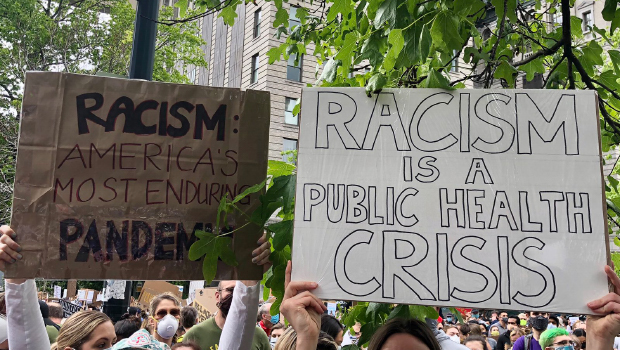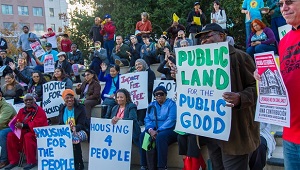No going back: We must rise up now to end structural racism

Photo by Julie B. Cooper, MPA, KPWHRI research project manager
Dr. Rita Mangione-Smith shares 6 changes our research institute can make to address racism as a public health crisis.
By Rita Mangione-Smith, MD, MPH, Kaiser Permanente Washington Health Research Institute executive director and Kaiser Permanente Washington vice president for research and health care innovation
Structural racism is nothing short of a public health crisis. As a public-interest research institute, we must acknowledge that this crisis is ours to address. We must examine how racism pervades the work we do and how we do it. And then we must rise up to make some big changes.
Our commitment to ending racism needs to be a fundamental part of who we are—reflected in our mission and woven into our daily lives. After a months-long, collaborative process we began in January, Kaiser Permanente Washington Health Research Institute (KPWHRI) will soon finalize our new mission, vision, and values (MVV) statements. Based on dozens of MVV discussions involving most of our workforce over the last several months, I fully expect that equity, inclusion, and diversity will be included prominently in our central ideals.
I also expect that our subsequent strategic plan will include initiatives to undo structural racism in research and medicine generally—and in our workplace in particular. But we shouldn’t wait on a final strategic plan to take action. Here are 6 changes we can start exploring today to support better health and better lives for Black people and all people of color.
1. Require training on structural racism, equity, inclusion, and diversity.
Like all organizations, our workforce reflects a broad spectrum of where people are—and specifically where white people are—in their understanding of structural racism. We’re not all on the same page in terms of recognizing how racism influences how we do our research and what we propose to study. We all need to have these issues top of mind in our daily work—but right now, that’s not our reality.
A key step toward changing that is to require periodic trainings on structural racism, equity, inclusion, and diversity. KPWHRI’s Equity Team Steering Committee has done a fabulous job of bringing us training and learning opportunities in this space. But requiring that we all receive robust training together is the only way we’ll successfully create a culture where it comes naturally to combat racism in the work we do every day.
2. Make race and ethnicity a central focus of our research.
KPWHRI can be proud of our broad expertise and research portfolio, including groundbreaking work in the fight against the COVID-19 pandemic. But we must acknowledge that we’re not doing enough to fight the pandemic of racism.
Some of our studies explore issues like health disparities and equitable access to care, and we have a growing portfolio of research on social determinants of health. But we must get better at examining the role of race and ethnicity in all our research. This means consistently asking the right questions: How do race and ethnicity influence what we’re studying? How are we addressing disparities in the scientific aims of our grants? How can we ensure our interventions are meaningful and equitable across diverse populations?
Broadening our portfolio in this way will take a lot of purposeful action, including developing a much more diverse workforce and hiring specifically for the skills and expertise we lack in health equity research. We also need to work with our funders to develop feasible approaches to testing interventions in multiple languages.
3. Create a community-based advisory board.
Doing robust health equity research will also require that we do a better job of seeking representation from our communities as we develop our research agenda and identify our study populations. Many research organizations that do community-based participatory research create community advisory boards that review proposed research projects through the lens of the community—asking questions like, ”Is the study responding to an important need?” and “Does the study population accurately represent the community?”
Creating an advisory board would help us better understand where we’re falling short in addressing racism and what else needs to change to ensure our research is equitable and inclusive.
4. Develop metrics to hold ourselves accountable.
We also need ways to hold ourselves accountable internally by setting specific goals related to equity, inclusion, and diversity and using metrics to show us where we still need to improve. At the very least, we can try to start tracking how many Black and Brown people we’re including in our research and how well our study populations represent our communities. Then, over time, we can develop a comprehensive set of EID metrics that are integrated into our standard performance dashboard.
5. Keep our open dialogue going.
I’ve heard many colleagues express fear that “people will start to forget”—meaning that, 2 or 3 weeks from now, when we’re further away from recent acute events, all our momentum around anti-racism will fade into the background. We cannot and will not let this happen—regardless of whether race is making the nightly news. We must continue the open dialogue we began at our June All Institute Meeting, where many Black colleagues and other colleagues of color shared with us the painful realities of racism they’ve faced in our workplace and in the research field in general.
These stories are not easy to hear. But we must keep hearing them—and that means we must be willing to create space, to ask hard questions, and to listen to the answers, whatever those answers may be.
6. Look for ways to work toward ending racism every day.
Whether at work or at home, all of us can take some sort of action every day to help end racism. Our Equity Team is a great resource for everyone at KPWHRI who wants to learn and grow in this space, as is Kaiser Permanente Washington’s Health Equity and Access Team. Kaiser Permanente—both nationally and regionally—also offers many resources and learning opportunities in support of equity, diversity, and inclusion for all.
On my personal journey to understand racism and break down my own biases, I’ve found the book So You Want to Talk About Race by Ijeoma Oluo to be very helpful. When it comes to educating ourselves about racism, it’s important to remember that there are dozens of little things we can all do every day—things like listening to podcasts on race relations and watching films and TV shows that feature authentic stories of the Black experience.
The road ahead
I look forward to writing more soon about the changes our institute will be making as we make progress toward dismantling racism. Here’s what I know for certain right now: There’s no going back. As a research institute, we must recognize racism as a pandemic and a public health crisis. And we must rise up to help end it.
Social Determinants?

What’s wrong with the term ‘social determinants of health’?
Let’s change our language to allow room for resilience, hope, and effective intervention, writes Dr. Gregory Simon.
recent news

SPARCC learns from communities about improving racial equity
Mid-project report on a 6-region initiative shows steps forward in prioritizing equity in community development.
Video
Moving to Health
Where you live can affect your health, and a $2.67-million NIDDK-funded UW/KPWHRI project explores how.



